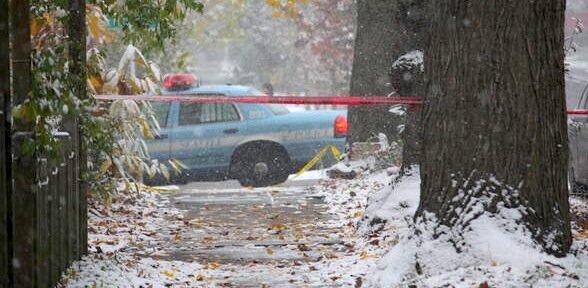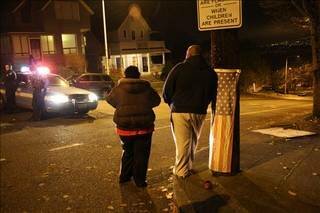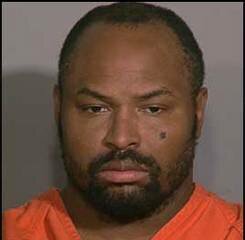 Photo: Capitol Hill Seattle blog
Photo: Capitol Hill Seattle blog
Mid-morning Monday, as snow was falling, Michael LaRosa walked up to a man he didn't know and repeatedly struck the 58-year-old's head with a hatchet, killing him, say Seattle police. The murder, on the 1400 block of East Union Street, occurred in view of students in a nearby school. ("I don't know what came over me, because I've never done murder, you know," LaRosa later told detectives.)
The Seattle Times contacted LaRosa's half-brother, in Florida, who said LaRosa has been diagnosed with paranoid schizophrenia, but occasionally believes he's well enough to quit taking medication. "Since moving to Seattle nearly three years ago, LaRosa had become a patient at Sound Mental Health on Capitol Hill and enrolled in Seattle Mental Health Court as part of a 2009 municipal-court case involving an assault on a security guard," reports the Times.
For Capitol Hill residents, those circumstances bring back all-too-vivid memories of the 2007 New Year's Eve murder of Shannon Harps by a Sound Mental Health patient with paranoid schizophrenia. (CHS: "In 2009, James Williams, who was receiving treatment and medication from Sound Mental Health prior to his crime, pleaded guilty to the stabbing murder of 31-year-old Shannon Harps....")
About a year ago, I wrote a piece called "King County's Mental Health is Deteriorating," based on an interview with Amnon Shoenfeld, director of the King County Mental Health, Chemical Abuse and Dependency Services Division. Schoenfeld mentioned the stress his department was under to deal with people whose mental illnesses made them unsafe for society, as funding was being cut for programs that paid for medications, and kept the dangerously unstable under constant supervision. ...
A little while ago, King County Superior Court Judge Michael Heavey had to defend himself for his support of Amanda Knox. Now her parents have had to appear, in Italy, at a pre-trial hearing for slander. If the case goes forward, they'll have to return in mid-October for trial--though it's likely they would have been there anyway, as that's when Amanda Knox's appeal of her 26-year murder sentence begins.
At issue is their response in a London Times interview in 2008, when her father recounted what Knox told him about her interrogation:
Curt says: "Amanda was abused physically and verbally. She told us she was hit in the back of the head by a police officer with an open hand, at least twice. The police told her, 'If you ask for a lawyer, things will get worse for you' and 'If you don’t give us some explanation for what happened, you’re going to go to jail for a very long time.'" Edda adds tearfully: "She was told she wouldn’t ever see her family again, and her family is everything to her."
Police in Perugia have denied those allegations, and both Amanda and her parents now face slander charges. Could we get the Perugia-Seattle sister city association in on this? If it felt a teensy bit like overkill to go after Amanda Knox for slander in addition to convicting her of murder, the case against her parents is remarkable in its devotion to the letter of the law. With a criminal justice system so thorough, Italy must near to stamping out crime entirely.
 Two people watch from the western perimeter of the stand-off at 30th & Yesler. Photo: CHS
Two people watch from the western perimeter of the stand-off at 30th & Yesler. Photo: CHS
UPDATE: Maurice Clemmons was shot and killed in the Rainier Valley early Tuesday morning, December 1.
Sunday night around nine, SWAT rolled to Seattle's Leschi neighborhood on a tip that Maurice Clemmons was hiding in a house there. After negotiating with the house for several hours, sending in a search robot, and tear-gassing it, police entered themselves but Clemmons was gone. (Police say they have evidence he was there, and that he was shot by one of the slain Lakewood police officers.) Reports so far this morning have Clemmons appearing in the University District, and then Beacon Hill.
Overnight, the 37-year-old Maurice Clemmons was upgraded from a "person of interest" to suspect in the slayings of four Lakewood police officers on Sunday morning. The murderer appeared at the Forza coffee shop across the street from the McChord Air Force base, buying a coffee and displaying a handgun to baristas who turned and fled, and then turning on the four police officers there, killing all of them, despite their vests.
The story has grown sadly reminiscent of the Shannon Harps murder, as the suspect Clemmons has a long trail of felonies and mental instability in his wake, and should have been in prison. A decade ago, he was released from the remaining 47 years of a sentence in Arizona. Publicola has the plea for clemency that Clemmons submitted to Governor Huckabee, who then commuted his sentence. (Huckabee has released a statement.) Later parole violations were not prosecuted.
In Washington this past May, Clemmons was charged with assaulting police officers who were investigating reports that Clemmons was throwing rocks through his neighbors' windows. He was also out on bail after being charged with child rape.
That's the big news coming out of Perugia today. A psychologist, Carlo Caltagirone, testified that, "She would have said anything to reduce the tension and stress and make the people questioning her happy," after more than 40 hours of questioning over a three-day period. False confessions have long been a controversial staple of American justice, most notoriously in the Central Park Jogger case, where four teenagers confessed to the brutal assault (and implicated a fifth) under pressure in 1989, only to have their convictions tossed out in 2002 when forensic evidence proved a completely different man acted alone to commit the crime. Whatever the case, Caltagirone is apparently the final witness in the case, meaning that sooner or later we can probably put this entire affair behind us.





Most Recent Comments